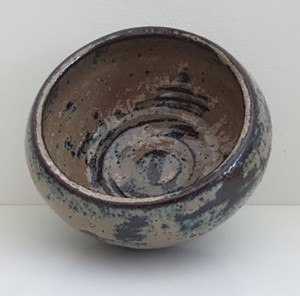Michael Nitsche
Somewhat hidden away on the top floor of the Student Center at Georgia Tech is the craft center. The size of a large classroom, it features some pottery wheels, shelves, paints and brushes, tools, workbenches, but no computer, screen, or projector in the main area. The doing, at least here, is physical. You come in, put on an apron, collect your tools, and sit on the wheel. It is a great place to work on media.
Stuff and its making is personal matter. We build not only a frame for a house to have a sheltering roof but also one for ourselves to define who we are—willingly or utterly unaware of the consequences. This equally applies to digital artifacts but it becomes evermore complicated when those artifacts are procedural machines themselves. Whether we build a digital media artifact—like an interface, a video game, a 3D world, a web site—or whether we use one—play a game, surf the web, text on a cell phone—the action is a defining one not only for the digital world but also for us, as we are constantly recreating ourselves anew through it.
What creative practices make up these actions and how can we claim them—or in some cases re-claim them from legal or technological straight jackets—back for the human who makes the action and herself through it?
In today’s globalized economies craft is a marginal player. Making your own mug might very well be more expensive than buying an imported one. It probably will be more flawed and it certainly will take more time. As commercially viable production, craft is hard to sustain. Leaning on craft is also not treading a way back to Ruskin-infused utopias of yesterday. There is no step out of a mediated society, which is why we need every help we can find to live within it. Sidestepping the vocabulary and practices of “virtual” digital media by focusing on the wet clay spinning under your hands is not a revivalist rejection but a gesture of reclaiming and recontextualizing. From a design perspective, it supports the realization that our actions are never virtual but remain constructions of self and others. From a technological perspective, it emphasizes the “physical” and the “things” in expanding fields such as physical computing and the Internet of Things.
At the far end of the Ferst Center, not too far from the craft shop, a second place deals with this challenge in its own way. Georgia Tech’s black box theater is the home to DramaTech and lays claim to be the longest continuously running theater in Atlanta. Whenever possible, I take my students for at least one session per term into the black box. At times we awkwardly play between the set pieces of some stage production or present our concepts and ideas literally from a stage using props for an upcoming musical. We have conducted Improv exercises, dance workshops, puppetry rehearsals, cell phone theater, among other things—all in pursuit of digital media design.
Performance is production like crafting, but of expression. It is a form of making and setting a frame. The black box is not only an inspirational place, it is also a testing ground for the performance of self that digital media inherently include. Theater, much like craft, is largely seen as a niche media, surpassed long time ago by film, television, and video games. Yet, once again, the turn to performance is not a revisionist step back but a necessary move forward as the digital transcends our everyday life. Pressing a button on the keyboard at our working desk, looking at the screen of a cell phone during a bus ride, and being motion captured by a game console as we exercise in our living room—these are relevant actions not only for the digital device but also for our surroundings. They make the spaces not only in the virtual worlds they are read into, but also in the physical worlds where they originate.
Because digital media remains a developing field where new challenges rise seemingly with the cycles of next gen game consoles and smartphones, we need spaces like craft shops and theater stages. They are practical workshops for creative activity that is at the heart of our interaction with digital stuff. My work as a digital media designer is explorative as it tries to grow with the field. To do so, it builds on those spaces of practice. Explorative means that it develops prototypes and classes that help us to ask new questions, instead of teaching pre-conceived answers. Exploration means that we produce analyses of the existent mediascapes as well as relevant questions to challenge them—in theory and practice. The shop and the stage are two locations that help us to do exactly that.

